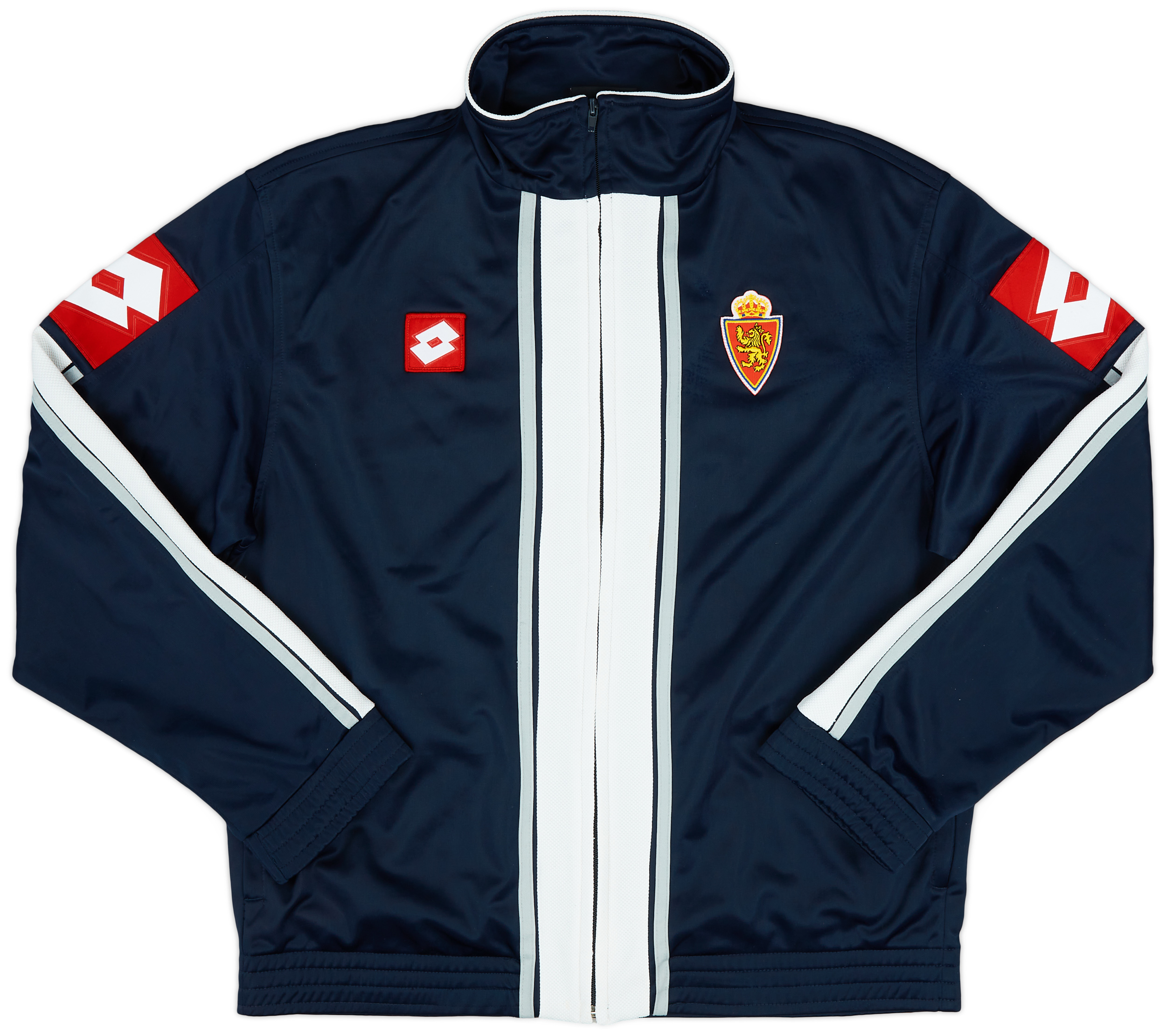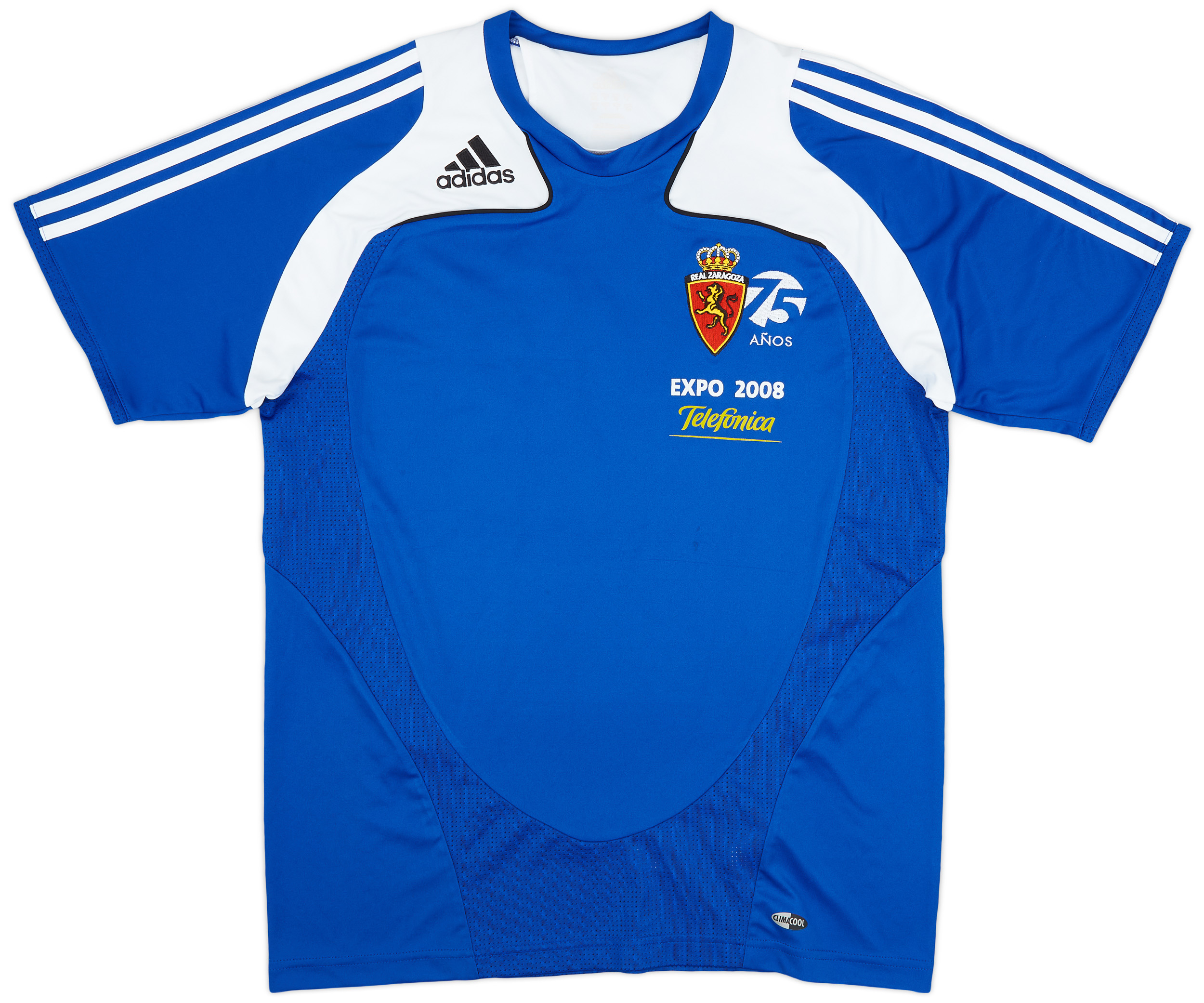Real Zaragoza
Introduction Real Zaragoza, a football club steeped in tradition and passion, serves as a beacon of sports culture in Spain. Founded more than a century ago, the club has cultivated a rich legacy that resonates deeply with its local community and football fans around the globe. Known for its blue and white colors, Real Zaragoza […]
1997-98 Real Zaragoza Away L/S Shirt - 8/10 - (M)
207.99£ - ca: €245
1995-97 Real Zaragoza Away Shirt #11 - 8/10 - (M)
177.99£ - ca: €210
1999-00 Real Zaragoza Luanvi Padded Bench Coat - 8/10 - (L)
177.99£ - ca: €210
1998-99 Real Zaragoza Third Shirt - 6/10 - (L)
148.99£ - ca: €176
1999-01 Real Zaragoza Home Shirt - 9/10 - (S)
148.99£ - ca: €176
1999-01 Real Zaragoza Home Shirt - 8/10 - (XL)
148.99£ - ca: €176
2005-06 Real Zaragoza Away Shirt - 8/10 - (M)
118.99£ - ca: €140
1999-01 Real Zaragoza Luanvi Hooded Bench Coat - 9/10 - (L)
118.99£ - ca: €140
2006-07 Real Zaragoza Away Shirt - 9/10 - (L)
106.99£ - ca: €126
2005-06 Real Zaragoza 'Copa Del Rey Final 2005-06' Third Shirt - 9/10 - (L)
106.99£ - ca: €126
2005-06 Real Zaragoza 'Copa Del Rey Final 2005-06' Third Shirt - 9/10 - (XL)
106.99£ - ca: €126
2005-06 Real Zaragoza 'Copa Del Rey Final 2005-06' Third Shirt - 8/10 - (L)
106.99£ - ca: €126
2003-05 Real Zaragoza Home Shirt - 7/10 - (L)
106.99£ - ca: €126
2003-05 Real Zaragoza Lotto Track Jacket - 9/10 - (L)
94.99£ - ca: €112
1997-99 Real Zaragoza Home Shirt - 5/10 - (M)
94.99£ - ca: €112
1994-95 Real Zaragoza Basic Home Shirt - 9/10 - (S)
94.99£ - ca: €112
2009-11 Real Zaragoza Player Issue Third Shirt - 6/10 - (L)
82.99£ - ca: €98
2009-11 Real Zaragoza Away Shirt (M)
70.99£ - ca: €84
1998-99 Real Zaragoza Away Shirt #6 - 5/10 - (XL)
70.99£ - ca: €84
1998-99 Real Zaragoza Away Shirt - 5/10 - (XL)
70.99£ - ca: €84
1998-99 Real Zaragoza Away Shirt #10 - 5/10 - (S)
70.99£ - ca: €84
2005-06 Real Zaragoza Lotto Training L/S Shirt - 6/10 - (M)
58.99£ - ca: €70
2005-06 Real Zaragoza Away Shirt - 5/10 - (XXL)
58.99£ - ca: €70
2004-05 Real Zaragoza Lotto Training Shirt - 9/10 - (L)
53.99£ - ca: €64
2008-09 Real Zaragoza adidas Training Shirt - 8/10 - (L)
53.99£ - ca: €64
2013-14 Real Zaragoza Mercury Training Shirt - 8/10 - (XXL)
41.99£ - ca: €50
2008-09 Real Zaragoza adidas Track Jacket - 7/10 - (L.Boys)
35.99£ - ca: €42
2019-21 Real Zaragoza Away Shirt - 8/10 - (L.Boys)
29.99£ - ca: €35
Warning: A non-numeric value encountered in /var/www/netskribent.dk/retro-football-shirt.com/wp-content/themes/boot5/single-clubs.php on line 148
Introduction
Real Zaragoza, a football club steeped in tradition and passion, serves as a beacon of sports culture in Spain. Founded more than a century ago, the club has cultivated a rich legacy that resonates deeply with its local community and football fans around the globe. Known for its blue and white colors, Real Zaragoza has become synonymous with resilience and determination on the field. As part of Spain’s La Liga, the club proudly represents the city of Zaragoza, situated in the northeastern part of the country, where its history and identity continue to thrive.
Club History
Real Zaragoza was founded in 1932 through the merger of several clubs, including Zaragoza Football Club and Club Zaragoza. The establishment of the club marked a significant moment in the local sports landscape, as it aimed to unite football enthusiasts under one banner. Real Zaragoza quickly made a name for itself, earning promotion to La Liga in 1940. Through the decades, the club has weathered highs and lows, showcasing its resilience during challenging periods, including relegation to lower divisions and triumphant pushes back to Spain’s top league.
One of the key moments in the club’s history occurred in the late 1960s and 1970s when Real Zaragoza began to establish itself as a competitive force in Spanish football. The club enjoyed considerable success during this period, winning its first Copa del Rey in 1964 and cementing its status during the following years with domestic and European performances.
Achievements
Real Zaragoza boasts an impressive collection of accolades that underscores its historical significance in Spanish football. The club has clinched the prestigious Copa del Rey title six times, with victories in 1964, 1966, 1986, 1991, 2001, and 2003. Additionally, Real Zaragoza experienced international success, notably winning the 1995 UEFA Cup Winners’ Cup, a triumph that highlighted the club’s abilities on a European stage and brought international recognition.
In terms of league performance, the club has spent numerous seasons in La Liga, showcasing its competitive capabilities in Spain’s top tier. The club’s consistency in La Liga places it among the noteworthy teams in Spanish football history. Although Real Zaragoza has experienced relegation in recent years, the club continues to aim for a return to the elite division, fostering hope among loyal fans.
Significant Players and Matches
Real Zaragoza’s history is adorned with notable players who have left an indelible mark on the club. One such figure is Francisco “Paco” Herrera, a legendary player known for his skill and versatility during the 1970s. Another significant name is Cuco Ziganda, whose contributions in the midfield led to crucial victories and helped shape the team’s identity in the late 20th century.
Additionally, the club has been home to prominent modern players, such as Gabi Fernández, who made significant contributions during his tenure with Real Zaragoza. The Spain international was pivotal in the club’s success during the early 2000s and received widespread acclaim for his leadership on the pitch.
Highlight matches that resonate with fans include the dramatic Copa del Rey final in 2001, where Real Zaragoza faced the formidable Real Madrid. With a thrilling 3-2 victory, Real Zaragoza emerged as champions, a moment that emphasized the club’s capability to succeed against the odds.
Cultural Impact
Real Zaragoza has cultivated a vibrant fanbase that extends far beyond matchdays. The club’s local supporters—affectionately known as “zaragocistas”—are known for their passionate displays during games, filling La Romareda stadium with energy and pride. This connection between the fans and the club reflects a deep-rooted sense of identity that ties together the community, making Real Zaragoza more than just a football club; it is a symbol of regional pride.
The club also contributes to local culture through various community initiatives, youth programs, and engagement activities that promote sportsmanship and teamwork among the younger generation. The impact of Real Zaragoza is felt in every aspect of local life, from the bustling streets during match days to the spirited gatherings at local establishments for screenings of key matches.
Conclusion
In conclusion, Real Zaragoza has earned its place in football history through its illustrious achievements, significant players, and meaningful connections with the local community. The club embodies the spirit of resilience, ambition, and identity, making it a treasured entity in Spain’s football landscape. Whether navigating the highs of championship victories or striving for its return to elite competition, Real Zaragoza remains an enduring symbol of hope and pride for its fans and the city it represents. As the club continues to evolve in the world of football, it carries with it a legacy that is rich, inspiring, and steadfast.



























